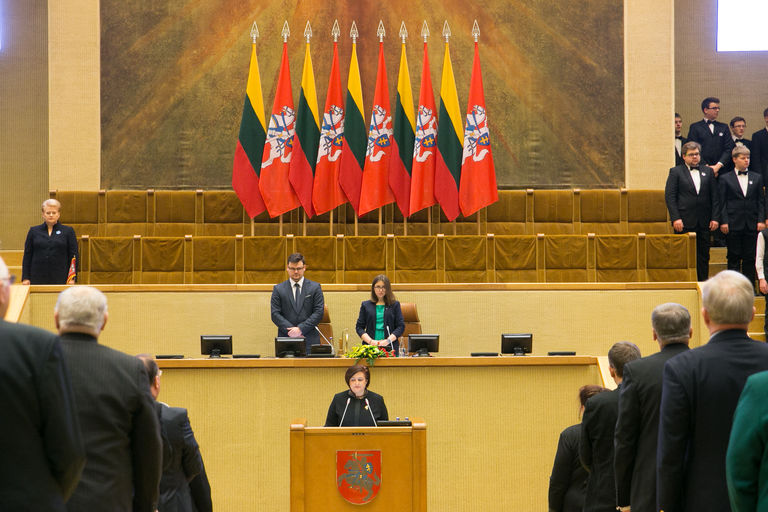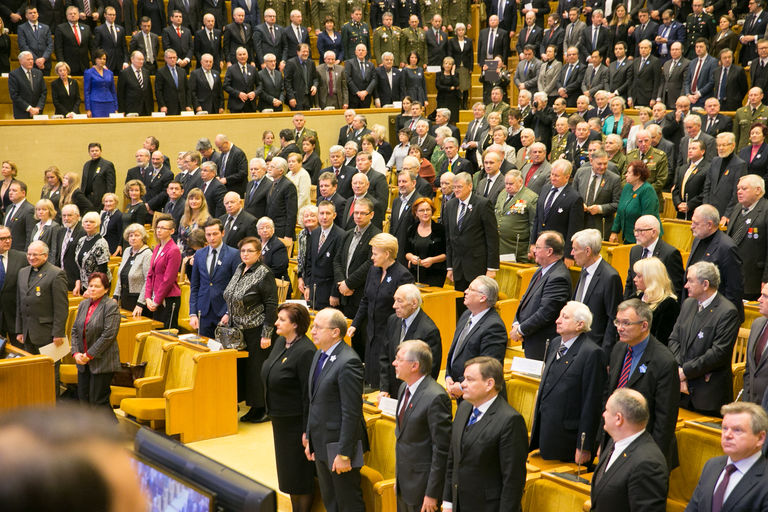Press release, 13 January 2016
On 13 January 2016, the Seimas hosted a solemn commemoration of the Day of the Defenders of Freedom to mark the 25th Anniversary of the Defence of Freedom of Lithuania.


Photos of the Office of the Seimas (author Olga Posaškova)
Loreta Graužinienė, Speaker of the Seimas, commenced the commemoration, held in the historical Hall of the Act of 11 March, and invited everyone to observe a minute of silence in tribute to the fallen fighters for freedom. “It is the 25th time today that we are marking the Day of the Defenders of Freedom of Lithuania and honour the memory of those who died for freedom. The names of those who gave away the most precious thing they had – their lives – for the future of Lithuania were inscribed in the history of our Freedom,” the Speaker of the Seimas underlined.
Dalia Grybauskaitė, President of the Republic of Lithuania, said that it was a special day when our thoughts went a quarter of a century back to the challenging and tragic night of the 13th of January. “The participants of the events of the 13th of January are connected by a unique and unbreakable bond that forges a link across generations. The children who were born in 1991 breathed in freedom together with Lithuania, and together with Lithuania they learnt to stand on their feet. Today, they are grown-up young men and women, walking down the path of life. Their hearts are encoded with resolve and determination to defend Lithuania if such a need arises,” the President of the Republic said.
President Grybauskaitė was convinced that we felt a bond of unity with the people of Ukraine, whose representatives were among us during the commemoration. “Lithuania, too, felt the strong support of the international community during the fatal days of the 13th of January – the support that we will always remember with deep gratitude. From our own experience, we can assure Ukraine that its fight for freedom to create an open European state will be crowned with victory. However, great determination is necessary on this path,” Ms Grybauskaitė stressed.
Priest Robertas Grigas, who was on watch along with other defenders of freedom by the Parliament on that night of bloodshed on 13 January 1991, emphasised in his speech that we had faced all the nastiness of aggression, political violence and arrogance of the “Big Brother”, which could constantly be observed across the world today and which is displayed by great powers and nations with respect to the smaller and weaker ones. “However, we did not respond in the same way, although this might have seemed a rather natural and logical reaction. We neither threw stones or sticks nor fired bullets at our invaders in Vilnius. We did not return violence for violence. We stood in front of their armoured vehicles and bayonets and sang songs about the things that were precious to us. <...> Our (alleged) weakness paradoxically turned into our greatest strength. The imperial machine of coercion exposed its meanness in front of the whole world. Although being exterminated, Lithuania remained non-violent and emerged as the land of martyrs and won universal sympathy. The charm of the propaganda of Gorby the Democrat paled into insignificance when put against the moral advantage of Lithuanians and the blood they shed on the 13th of January,” Priest Grigas noted. He also maintained that, apart from being true stakeholders of extraordinary heritage of the spiritual fight, we, in particular the so-called political class, also had important obligations to each other and to our people. “The sacrifice and the beauty of the 13th of January will be meaningless if we fail to preserve our nation,” he said.
Prof. Arūnas Ramanavičius from Vilnius University, who was injured at the Television Tower, said that the 13th of January stepped into the history of our nation as an extremely important, climactic and even symbolic event, which liberated the endless hope, will and determination of our people to brake free once-and-for-all from slavery and to have and protect their own country rather than the country that is oppressed and controlled by the hard-to-understand dictatorship regime from behind the red walls of the Kremlin. “The wheel of history has inexorably been spinning around; technologies have been rapidly developing; conditions and environment have been changing; but there has always been one thing that has remained stable – that is the fundamental principles of existence and survival of the nation. When a state or any community has no longer got any will and determination to defend itself against aggression, it is inevitably doomed to slavery or is even eliminated from further global development. Unfortunately, the sky in the East has currently become “red” and this, as you know, is not a very good sign for us. We increasingly hear hesitation as to whether or not NATO will protect us in case of need. But it is us, with our unique experience gained during the 13th of January, that have to be able to protect not only ourselves but our allies too,” Prof. Ramanavičius said. He was convinced that military service should be compulsory for every Lithuanian man, rather than just for a handful of volunteers or lottery-selected conscripts.
Ričardas Jasponis, one of the builders of the barricades, reminded of his contribution in erecting the barricade near the Parliament in Gediminas Avenue, which feature the inscription “The Heart of Lithuania” by one of the freedom fighters, Romualdas Lankas.
Vanda Pumputienė, Deputy Director of Vilnius Medical Emergency Service, shared her recollections of the selfless work in providing first aid to the injured at the Television Tower on the night of 13 January 1991.
Paulius Baltokas, President of the Lithuanian National Union of Students, noted that if we were to look at the modern global history, students from all over the world could have always been noticed to be in the forefront of events, and Lithuanian students were no exception to this. “It is true that my generation cannot remember the tragic events of the 13th of January and the fight for freedom; it is also true that at the time we could in no way contribute to the fulfilment of the idea of a free Lithuania, which has been nurtured for decades. We must nevertheless act now and preserve the hard-fought freedom of Lithuania,” Mr Baltokas said.
The solemn commemoration was co-chaired by Paulius Baltokas, President of the Lithuanian National Union of Students, and Indrė Pabijonavičiūtė, President of the Lithuanian Pupils’ Parliament. The participants listened to the performances by the boys’ choir Ąžuoliukas and the girls’ choir Liepaitės.
Rimas Rudaitis, Press Office, Information and Communication Department, Office of the Seimas, tel. +370 5 239 6132, e-mail: [email protected]





